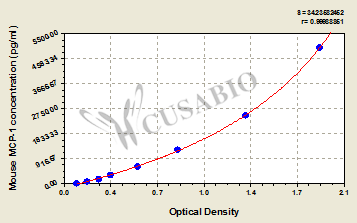The mouse MCP-1 ELISA kit uses the quantitative sandwich enzyme immunoassay technique to measure the levels of mouse MCP-1 in the serum, plasma, or tissue homogenates. Antibody specific for MCP-1 has been pre-coated onto the microplate. Standards and samples are pipetted into the wells and any MCP-1 present is bound by the immobilized antibody. After removing any unbound substances, a biotin-conjugated MCP-1 antibody is added to the wells. After washing, avidin conjugated HRP is added to the wells, forming an antibody-antigen-enzyme-labeled antibody complex. Following a wash to remove any unbound HRP-avidin, the TMB substrate solution is added to the wells, and the color develops into blue. The color changes from blue to yellow after adding the stop solution to the wells. The color intensity is proportional to the amount of MCP-1 bound in the initial step.
CCL2, also known as MCP-1, is a monocyte chemoattractant protein well-known for its ability to drive the chemotaxis of myeloid and lymphoid cells. CCL2 is found in the circulation and has been identified as a diagnostic biomarker of breast cancer and prostate cancer. In tissues, CCL2 attracts leukocytes to sites of infection or injury to mediate defense and repair. The CCL2-CCR2 signaling initiates several intracellular downstream signaling pathways, including JAK2/STAT3, MAPK, and PI3K pathways that are involved in tumor progression, such as increasing tumor cell proliferation and invasiveness and creating a tumor microenvironment through increased angiogenesis and recruitment of immunosuppressive cells. CCL2 is involved in the pathogenesis of inflammatory and neurodegenerative diseases, such as atherosclerosis, diabetes, rheumatoid arthritis (RA), neuropathic pain, and multiple sclerosis.




